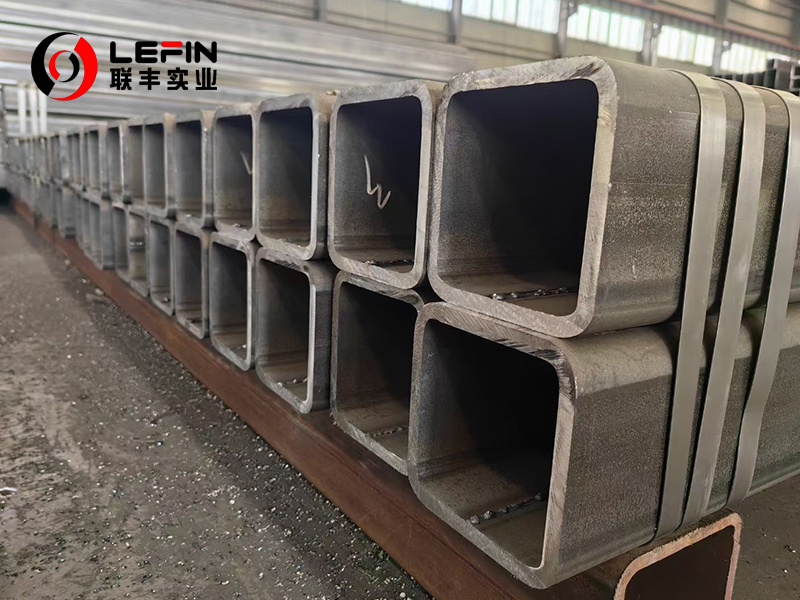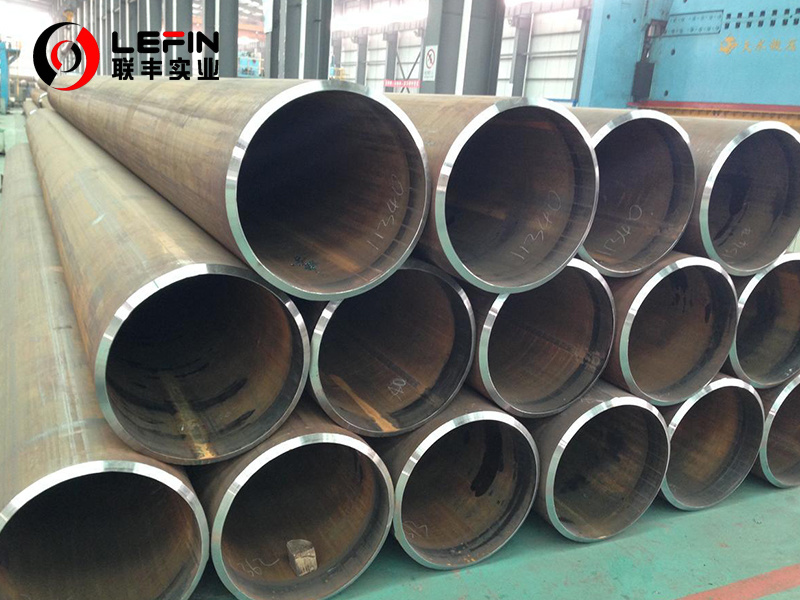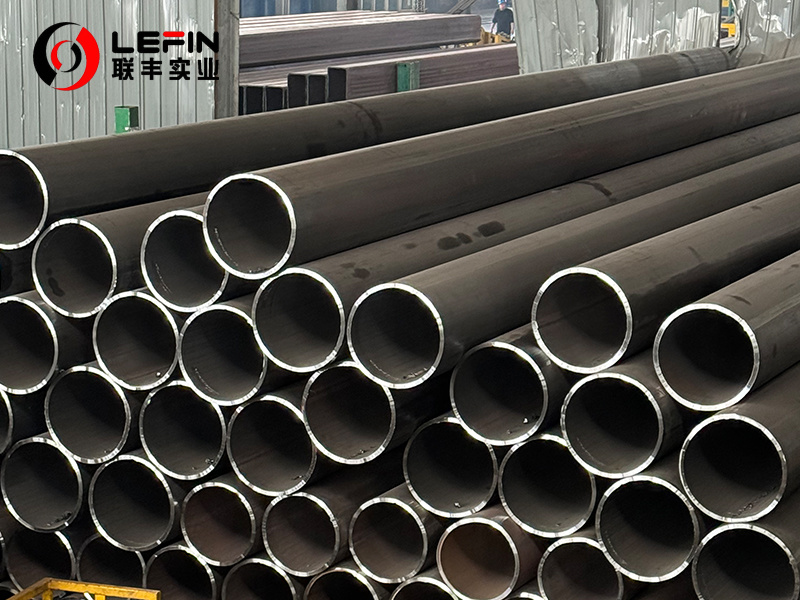




- Details
-
Regarding HOT FINISH PIPE (commonly known as hot-rolled/hot-expanded seamless steel pipe), it is a kind of seamless steel pipe formed by hot working technology and plays a key role in industrial infrastructure. The following table can help you quickly understand its core information:
Characteristic dimension Hot Finished Seamless Pipe Core process Heating solid steel billets to high temperatures and rolling them through perforated bars to form hollow tube shells. main charateristic Higher strength and pressure-bearing capacity
Relatively thick wall thickness, wide diameter range
Relatively rough surface, dimensional accuracy is usually lower than that of cold-rolled pipes
Key advantages - No welds: Uniform structure, high reliability, suitable for high-pressure environments
- Economical and efficient: Compared with some processes, it is more suitable for manufacturing large-diameter thick-walled pipes, with high material utilization
Typical applications Oil and gas transmission pipelines, pressure pipelines, structural components of mechanical equipment, boiler equipment, etc 🔧 Process details and significance
The manufacturing of hot-rolled seamless steel pipes is a complex hot working process, with the core lying in "heat" and "seamless". The specific process flow is as follows:
1. Heating and piercing:
Solid round steel billets are heated to a softened state at high temperatures, and then punched into hollow thick-walled rough tubes (rough tubes) using a piercing machine.
2. Rolling and Shaping:The hot capillary tubes then undergo continuous rolling or extrusion processes to extend the tube body, uniform the wall thickness and approach the final size.
3. Sizing and finishing:Ensure that the steel pipe reaches the precise outer diameter size through a sizing machine, and then carry out finishing treatments such as cooling and straightening.
4. Inspection and Warehousing:At the end, strict quality inspections will be conducted, such as water pressure tests and non-destructive testing. Only those that pass will be warehoused.
This process avoids the potential weak points that may arise from welding, enabling the steel pipe to better withstand high pressure. Meanwhile, the hot-rolling process enables it to economically produce large-diameter, thick-walled steel pipes, meeting the demands of large-scale projects.
💎 Summary and selection suggestions
In conclusion, hot-rolled seamless steel pipes, with their one-piece structure, perform exceptionally well in terms of strength, pressure-bearing capacity and reliability, and are the foundation for many demanding industrial applications.
When making a choice, if your application scenario involves high pressure, high temperature or has extremely high requirements for structural integrity (such as main oil and gas pipelines, high-pressure boiler components), then hot-rolled seamless steel pipes are usually a more reliable option. If higher requirements are placed on dimensional accuracy and surface finish, cold-rolled (cold-drawn) seamless steel pipes may need to be considered.

HOT FINISH PIPE
Subcategory
Keyword
- Details
-
Regarding HOT FINISH PIPE (commonly known as hot-rolled/hot-expanded seamless steel pipe), it is a kind of seamless steel pipe formed by hot working technology and plays a key role in industrial infrastructure. The following table can help you quickly understand its core information:
Characteristic dimension Hot Finished Seamless Pipe Core process Heating solid steel billets to high temperatures and rolling them through perforated bars to form hollow tube shells. main charateristic Higher strength and pressure-bearing capacity
Relatively thick wall thickness, wide diameter range
Relatively rough surface, dimensional accuracy is usually lower than that of cold-rolled pipes
Key advantages - No welds: Uniform structure, high reliability, suitable for high-pressure environments
- Economical and efficient: Compared with some processes, it is more suitable for manufacturing large-diameter thick-walled pipes, with high material utilization
Typical applications Oil and gas transmission pipelines, pressure pipelines, structural components of mechanical equipment, boiler equipment, etc 🔧 Process details and significance
The manufacturing of hot-rolled seamless steel pipes is a complex hot working process, with the core lying in "heat" and "seamless". The specific process flow is as follows:
1. Heating and piercing:
Solid round steel billets are heated to a softened state at high temperatures, and then punched into hollow thick-walled rough tubes (rough tubes) using a piercing machine.
2. Rolling and Shaping:The hot capillary tubes then undergo continuous rolling or extrusion processes to extend the tube body, uniform the wall thickness and approach the final size.
3. Sizing and finishing:Ensure that the steel pipe reaches the precise outer diameter size through a sizing machine, and then carry out finishing treatments such as cooling and straightening.
4. Inspection and Warehousing:At the end, strict quality inspections will be conducted, such as water pressure tests and non-destructive testing. Only those that pass will be warehoused.
This process avoids the potential weak points that may arise from welding, enabling the steel pipe to better withstand high pressure. Meanwhile, the hot-rolling process enables it to economically produce large-diameter, thick-walled steel pipes, meeting the demands of large-scale projects.
💎 Summary and selection suggestions
In conclusion, hot-rolled seamless steel pipes, with their one-piece structure, perform exceptionally well in terms of strength, pressure-bearing capacity and reliability, and are the foundation for many demanding industrial applications.
When making a choice, if your application scenario involves high pressure, high temperature or has extremely high requirements for structural integrity (such as main oil and gas pipelines, high-pressure boiler components), then hot-rolled seamless steel pipes are usually a more reliable option. If higher requirements are placed on dimensional accuracy and surface finish, cold-rolled (cold-drawn) seamless steel pipes may need to be considered.

Related products
Product Consulting

Address: Hengtai Road,Daqiuzhuang Town,Jinghai County,Tianjin,China
Mob: +8615122229899(whatspp)
Phone: +86 22 58171905
Fax: +86 22 58171902
E-mail:info@lefinsteel.com
Get company updates

Tianjin Lefin Industrial Co.,Ltd. All rights reserved City sub-station SEO www.300.cn





